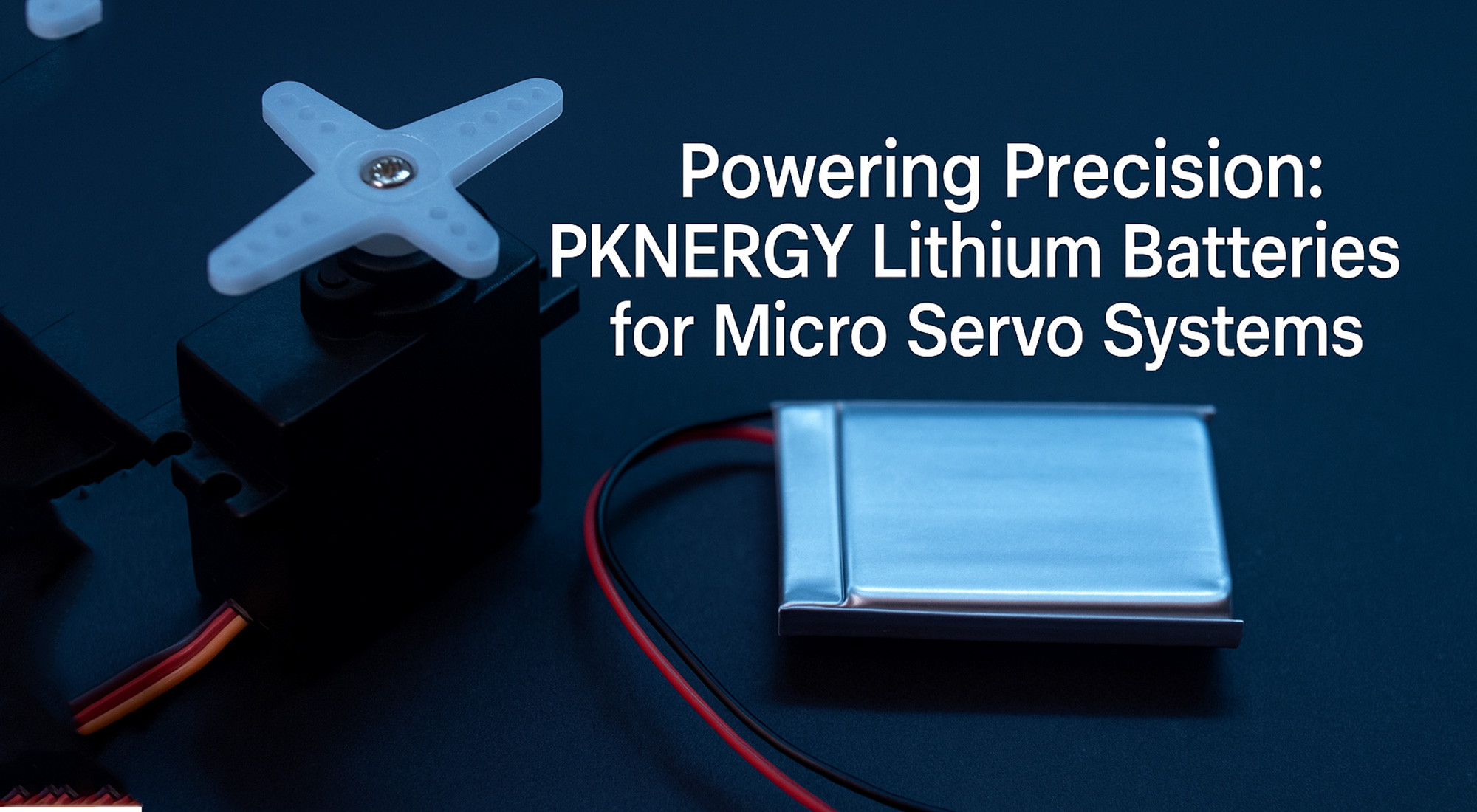Powering Precision: PKNERGY Lithium Batteries for Micro Servo Systems
Stable, lightweight and high‑efficiency packs engineered for miniature robotics, drones, gimbals and medical devices.
Why Lithium Batteries for Micro Servos
Micro servo motors demand fast, precise actuation and a battery that can deliver consistent current with a stable voltage curve under fluctuating loads. Compared with NiMH or alkaline cells, lithium‑ion and lithium‑polymer (Li‑Po) deliver much higher energy density and lighter weight, enabling longer operation in tight spaces.
- High discharge efficiency for rapid response and torque stability.
- Compact & lightweight form factors that fit miniature enclosures.
- Stable voltage to ensure control accuracy during dynamic movements.
- Long cycle life to sustain hundreds of charge/discharge cycles.
Application Scenarios
- Miniature Robotics — education/industrial robots requiring precise motion.
- RC Models & Drones — lightweight packs maximize flight time and control stability.
- Camera Gimbals & Smart Devices — smooth power for continuous positioning.
- Medical/Lab Equipment — clean and reliable DC power for sensitive systems.
Example: a 3.7 V 1000 mAh Li‑Po rated up to 20C can drive multiple micro servos simultaneously with minimal voltage droop.
Typical Battery Configurations
| Use Case | Voltage | Capacity | Form Factor | Discharge | Notes |
|---|---|---|---|---|---|
| Micro robot arm / gimbal | 1S (3.7 V) | 800–1200 mAh | Li‑Po pouch | 10–20C | Ultra‑thin cell; compact EMI layout |
| Drone servo rail | 2S (7.4 V) | 1000–2000 mAh | Li‑ion 18650/21700 | 8–15C | Higher torque with DC‑DC regulation |
| Medical/Instrument module | 1S or 2S | 500–1500 mAh | Li‑Po or LiFePO₄ | 5–10C | Enhanced safety, low ripple supply |
PKNERGY Customization Capability
- Battery chemistry selection: Li‑ion (NMC), Li‑Po, LiFePO₄ Battery
- Flexible form factors: pouch, cylindrical, prismatic cells
- Integrated BMS/PCM: over‑current, over/under‑voltage, and temperature protection
- Connector & cable options: JST/PH/XT, custom harness and FPC
- Compliance & testing: UN38.3, IEC 62133, CE; aging, vibration, and drop tests
Need a unique shape or harness? Explore our Custom Pack service for ID‑matched batteries and charger pairing.
Battery Options & Comparison
| Parameter | Li‑ion (NMC) | Li‑Po (Pouch) | LiFePO₄ |
|---|---|---|---|
| Energy Density | High | High (very flexible shapes) | Moderate |
| Discharge Capability | 8–15C | 10–20C | 5–10C |
| Cycle Life | 600–1000+ | 500–800+ | 1500–3000+ |
| Best For | General high‑energy servo rails | Ultra‑compact, thin devices | Safety‑critical, long‑life modules |
FAQ
How do I size a battery for multiple micro servos?
Sum the stall‑current margins and typical running currents, then size capacity for the target runtime: Capacity (mAh) ≈ Avg Current (mA) × Hours / DoD. Validate with worst‑case motion profiles and temperature derating.
Do I need a separate BEC/DC‑DC regulator?
For 2S rails or sensitive MCUs, a buck regulator improves voltage stability and reduces ripple affecting servo control loops.
Which chemistry is safest for medical applications?
LiFePO₄ offers superior thermal stability and longer cycle life; combine with medical‑grade compliance and traceability.
Contact Cassie — PKNERGY
Let’s co‑design a compact, responsive power system tailored to your micro servo platform.
Post time: Nov-12-2025

